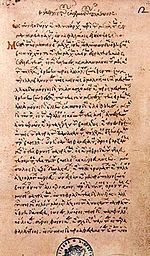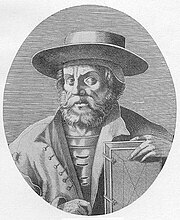Greek scholars in the Renaissance
From Wikipedia, the free encyclopedia
The migration waves of Byzantine Greek scholars and émigrés in the period following the end of the Byzantine Empire in 1453 is considered by many scholars key to the revival of Greek studies that led to the development of the Renaissance humanism and science. These émigrés brought to Western Europe the relatively well-preserved remnants and accumulated knowledge of their own (Greek) civilization, which had mostly not survived the Early Middle Ages in the West. The Encyclopædia Britannica claims: "Many modern scholars also agree that the exodus of Greeks to Italy as a result of this event marked the end of the Middle Ages and the beginning of the Renaissance",[5] although few scholars date the start of the Italian Renaissance this late.

_Calling_of_the_Apostles.JPG/180px-Argyropoulos_(detail)_Calling_of_the_Apostles.JPG)


